
José Alexandre "Xanana" Gusmão is an East Timorese politician. He has served as the 6th prime minister of East Timor since 2023, previously serving in that position from 2007 to 2015. A former rebel, he also served as East Timor's first president since its re-establishment of independence, from 2002 to 2007.

Doo-wop is a subgenre of rhythm and blues music that originated in African-American communities during the 1940s, mainly in the large cities of the United States, including New York, Philadelphia, Pittsburgh, Chicago, Baltimore, Newark, Detroit, Washington, D.C., and Los Angeles. It features vocal group harmony that carries an engaging melodic line to a simple beat with little or no instrumentation. Lyrics are simple, usually about love, sung by a lead vocal over background vocals, and often featuring, in the bridge, a melodramatically heartfelt recitative addressed to the beloved. Harmonic singing of nonsense syllables is a common characteristic of these songs. Gaining popularity in the 1950s, doo-wop was "artistically and commercially viable" until the early 1960s and continued to influence performers in other genres.
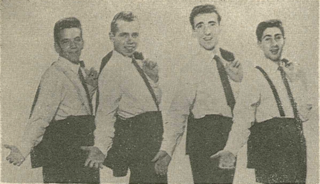
Danny & the Juniors was an American doo-wop and rock and roll vocal group formed in Philadelphia, Pennsylvania. Originally consisting of Danny Rapp, Dave White, Frank Maffei and Joe Terranova, the group was formed in 1955. They are best known for their 1957 no. 1 hit "At the Hop" and their 1958 follow-up hit "Rock and Roll Is Here to Stay".

Sha Na Na was an American rock and roll and doo-wop revival group formed in 1969. The group performed a song-and-dance repertoire based on 1950s hit songs that both revived and parodied the music and the New York City street culture of the 1950s. After gaining initial fame for their performance at the Woodstock Music and Art Fair, made possible with help from their friend Jimi Hendrix, the group hosted Sha Na Na, a syndicated variety series that ran from 1977 to 1981.

The Del-Vikings were an American doo-wop musical group that recorded several hit singles in the 1950s and continued to record and tour with various lineups in later decades. The group is notable for the hit songs "Come Go with Me" and "Whispering Bells", and for having been a successful racially mixed musical group during a period of time when such groups were rare.

"Tears on My Pillow" is a doo-wop song written by Sylvester Bradford and Al Lewis in 1958. The composition was first recorded by Little Anthony and the Imperials on End Records and was that group's debut recording under that name. Their original recording of the song became a Billboard top-10 hit, peaking at No. 4, No. 3 in Canada, and was the Imperials' first million-seller. It was also a two-sided hit, with its flip side, "Two People in the World," also becoming a major hit. Although it remains one of the Imperials' signature songs, "Tears on My Pillow" has been extensively covered, including a No. 1 in the UK Singles Chart version by Kylie Minogue in January 1990.
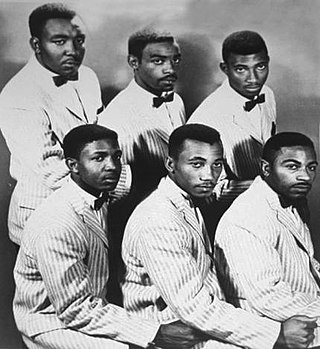
Maurice Williams and the Zodiacs were an American doo-wop/R&B vocal group in the late 1950s and early 1960s. Originally the (Royal) Charms, the band changed its name to the Gladiolas in 1957 and the Excellos in 1958, before finally settling on the Zodiacs in 1959.
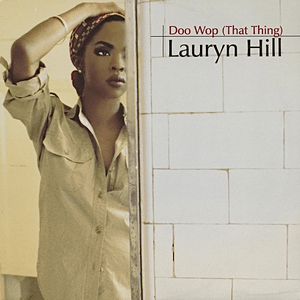
"Doo Wop (That Thing)" is a song by American rapper and singer Lauryn Hill from her debut solo studio album, The Miseducation of Lauryn Hill (1998). It was written and produced by Hill. The song was released as her solo debut and lead single from The Miseducation of Lauryn Hill on August 10, 1998, by Ruffhouse Records and Columbia Records. No commercial release was originally intended for the single in the US, but limited-quantity physical formats were issued two months later, on October 27.
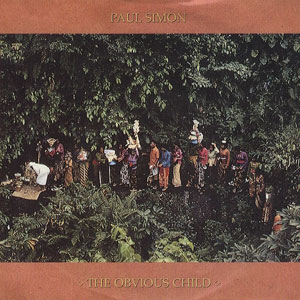
"The Obvious Child" is a song recorded by American singer-songwriter Paul Simon. It was the lead single from his eighth studio album, The Rhythm of the Saints (1990), released by Warner Bros. Records. Written by Simon, its lyrics explore mortality and aging. The song is accompanied by a performance from Brazilian drumming collective Olodum in a live recording.

"Who Put the Bomp " is a doo-wop style novelty song from 1961 by the American songwriter Barry Mann, who wrote it with Gerry Goffin. It was originally released as a single on the ABC-Paramount label (10237).
The Rays were an American group formed in New York City in 1955, and active into the early 1960s. They first recorded for Chess Records. Their biggest hit single was "Silhouettes", a moderately-slow doo-wop piece of pop music that reached number 3 on the Billboard Hot 100 in 1957 on Cameo after being initially released on the small XYZ Records. It sold over one million copies, and was awarded a gold disc. The song was written by Bob Crewe and Frank Slay, Jr. Also on XYZ, they had a minor hit with "Mediterranean Moon" a mid-chart hit with "Magic Moon".
"Get a Job" is a song by The Silhouettes released in November 1957. It reached the number one spot on the Billboard pop and R&B singles charts in February 1958, and was later included in Robert Christgau's "Basic Record Library" of 1950s and 1960s recordings, published in Christgau's Record Guide: Rock Albums of the Seventies (1981). The song celebrates the virtues of securing gainful employment.

"Silhouettes" is a song made famous by the doo-wop group the Rays in 1957, peaking at number 3 on the U.S Billboard Hot 100. A competing version by the Diamonds was also successful. In 1965 it was a number 5 hit in the US for Herman's Hermits, and in 1990 it was a number 10 hit in the UK for Cliff Richard.
Gerald Granahan was an American singer, songwriter, and record producer, best known for his work in the 1950s and 1960s.
"Book of Love" is a rock and roll / doo-wop song, originally by The Monotones. It was written by three members of the group, Warren Davis, George Malone and Charles Patrick.
"Little Darlin'" is a popular Top 40 song, made famous by the Diamonds.
"Bad Girl" is a 1959 doo-wop single by The Miracles. Issued locally on the Motown Records label, it was licensed to and issued nationally by Chess Records because the fledgling Motown Record Corporation did not, at that time, have national distribution. It was the first single released on the Motown label – all previous singles from the company were released on Motown's Tamla label. Although The Miracles had charted regionally and on the R&B charts with several earlier songs, including "Got a Job", "I Cry", "I Need a Change", and "(You Can) Depend on Me", "Bad Girl" was their first national chart hit, reaching #93 on the Billboard Hot 100. Written by Miracles lead singer Smokey Robinson and Motown Records' President and Founder Berry Gordy, "Bad Girl" is a sad, remorseful ballad about a young woman, whom Robinson, as the narrator, says "was so good at the start", but who later in the song "is breaking my heart". It is in the popular doo-wop style, as several of The Miracles' songs were during the late 1950s. The record's success, coupled with the distributor's failure to pay Gordy and The Miracles properly for its sales, prompted Robinson to urge Gordy to "go national" with it, meaning that Motown should do its own national distribution of its songs, and eliminate the middleman, to ensure that all money from sales of its records would go directly to the label.
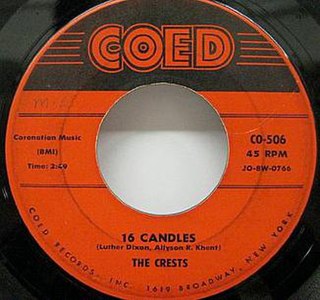
"16 Candles" is a 1958 song performed by the Crests and written by Luther Dixon and Allyson R. Khent.

"Remember Then" is a pop song written by Tony Powers and Beverly Ross, and first recorded in 1962 by doo-wop vocal group The Earls. Original copies of The Earls' version, on the Old Town label, show only Powers as the writer, while some later versions give a writing or co-writing credit to record producer Stan Vincent. BMI lists all three as co-writers.
"Pretty Little Angel Eyes" is a 1961 song by American singer Curtis Lee. It was released on Dunes Records, #45-2007. Phil Spector served as producer, and also produced Lee's follow-up hit "Under the Moon of Love".













